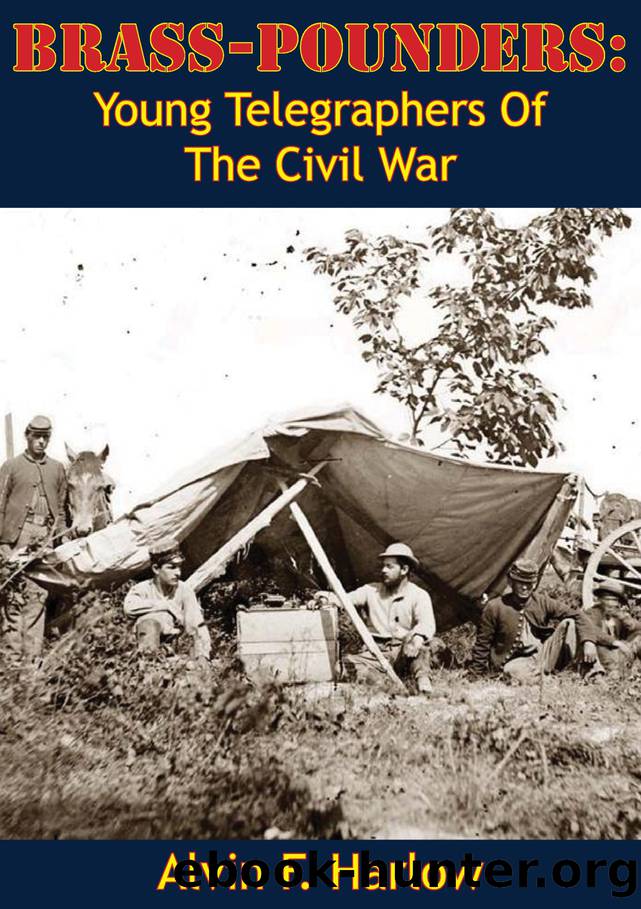Brass-Pounders: Young Telegraphers Of The Civil War by Harlow Alvin F.;

Author:Harlow, Alvin F.;
Language: eng
Format: epub
Publisher: Golden Springs Publishing
Published: 2015-11-14T00:00:00+00:00
VII â Bunnell on the Job
Late in June, 1862, the Federal Army of the Potomac, under General McClellan, had moved up the Virginia Peninsula, between the York and James Rivers, in a drive towards Richmond. It moved on both sides of the swampy little Chickahominy River, General Porterâs corps being on the north side of the swamp, the rest of the army on the south side. McClellan was hoping that Porter would be joined by 40,000 men under General McDowell, moving from the direction of Washington. {3}
On June 25th the Confederate army under General Lee moved to strike back at the invaders, and thus began the Seven Daysâ Battles. The first assaults were on Porterâs corps. On the second day there was a brief but fierce battle in the afternoon along the glen of Beaver Dam Creek, which ended with the Confederates being repulsed. Now at nightfall it was over, but they were still out there, a mile beyond the creek, watching and waiting, their next move a mystery. General McClellan, the supreme commander, whose headquarters were on the other side of the Chickahominy, ten mile away, had ridden over with some of his staff, to join General Porter during the engagement. After it, he remained for discussion, Jesse Bunnell, Porterâs telegraph operator, in his tiny tent alongside the Generalâs, had his hands full, keeping the top commander in touch with his own headquarters, and through it, with his other corps and division commanders south of the Chickahominy.
At eighteen, Jesse was already a veteran telegrapher. He had begun at eleven as a messenger boy in his home town of Massillon, Ohio, and two years later as an operator. He had three more winters in school, meanwhile continuing his key-pounding, then was a railroad telegrapher at various places in Ohio. He became noted for his speed in sending and receiving. In December, 1860, at seventeen, he made a two-hour record of 38 words per minuteâand there were some pretty long words in that document, tooâin sending President Buchananâs last Congressional message from Pittsburgh to Cincinnati, where it was received by L. C. Weir, another speed demon (later President of the Adams Express Company) without a break. When the war began, Jesse joined the Army Telegraph Corps.
Now in Porterâs tent, well back from the lip of the deadly battle ravine, the two generals, close friends since their West Point days, sat down to talk after the end of the fray. Once Jesse heard McClellanâs voice raised slightly in bitter vexation, saying, âAs I feared, I am not going to get the help of McDowellâs corps. The Administration is too fearful for its own skin to let him get out of sight. So he is being kept up there to guard Washingtonâagainst what? Against Stonewall Jackson, whereas I believe that Jackson is moving around to your right, aiming to help crush my army if possible.â
Dusk deepened into darkness and still the talk went on, hour after hour, as Porterâs various division and brigade
Download
This site does not store any files on its server. We only index and link to content provided by other sites. Please contact the content providers to delete copyright contents if any and email us, we'll remove relevant links or contents immediately.
| United States | Abolition |
| Campaigns & Battlefields | Confederacy |
| Naval Operations | Regimental Histories |
| Women |
In Cold Blood by Truman Capote(2702)
Steve Jobs by Walter Isaacson(2459)
All the President's Men by Carl Bernstein & Bob Woodward(1972)
Lonely Planet New York City by Lonely Planet(1857)
The Murder of Marilyn Monroe by Jay Margolis(1752)
The Room Where It Happened by John Bolton;(1729)
The Poisoner's Handbook by Deborah Blum(1671)
And the Band Played On by Randy Shilts(1632)
Lincoln by David Herbert Donald(1622)
The Innovators by Walter Isaacson(1612)
A Colony in a Nation by Chris Hayes(1530)
The Innovators: How a Group of Hackers, Geniuses, and Geeks Created the Digital Revolution by Walter Isaacson(1519)
Under the Banner of Heaven: A Story of Violent Faith by Jon Krakauer(1425)
The Unsettlers by Mark Sundeen(1347)
Amelia Earhart by Doris L. Rich(1346)
Birdmen by Lawrence Goldstone(1346)
Decision Points by George W. Bush(1261)
Dirt by Bill Buford(1247)
Zeitoun by Dave Eggers(1231)
